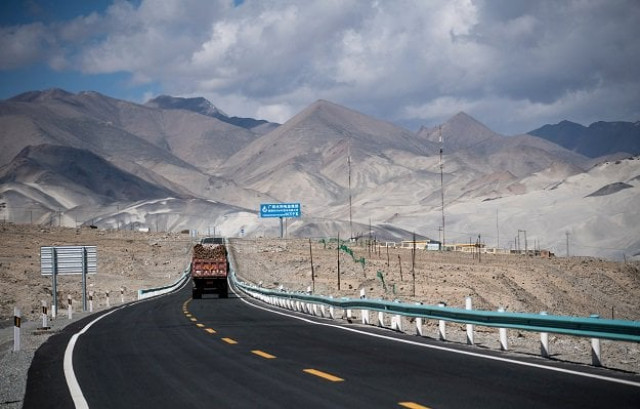To CPEC or not to CPEC
If the people of Pakistan want to truly make it a game changer, they have a role to play

CPEC route. PHOTO: AFP
A shift from globalisation to the new global economy has led to the development of Global Value Chains (GVC) ie breaking up of production process so different steps are carried out in different countries.
In simple terms, GVCs provide economic opportunities to developing countries for trade specialisation and strengthening their competitive advantage. In addition, as GVCs strengthen, the factor of ‘dependency’ and therefore, relevance to ‘cooperation’ increases.
For smaller economies to fully benefit from GVCs and not be left in a disadvantaged position, reduced trade tariff is among the most important factors. One validated model of establishing this is trade blocs and economic corridors. True, regional blocs may negatively impact ‘cooperation’ due to strategic reasons. Therefore, countries like China have undertaken sub-regional steps. Examples of this would be the Nanning-Singapore Economic Corridor and CPEC.
The China-Pakistan Economic Corridor is a long-term infrastructural project and part of China’s global initiative of ‘One-Belt, One-Road’. It connects Southern Chinese city of Kashgar to Gwadar Port, in southwestern Pakistan through multiple nodes and several passages. Co-financed by Beijing and Islamabad, it is valued at $62 billion and includes projects for road and railways network, energy, sea-port development and economic zones, besides others of a more social nature.
The benefits for Pakistan are many — CPEC brings the largest-ever amount in FDI at a time when Pakistan’s reserves have come to a historic low. With reference to infrastructural development, Pakistan would have faced severe challenges in undertaking the projects independently for two reasons; one, the high cost involved and second, technical expertise and experience that China brings to the table. In addition, it vows to create 700,000 jobs between the years 2015-2030.

There’s a flip side of the coin as well. A school of thought that questions CPEC’s role as a true game changer, argues about the corridor’s financial feasibility — will Build-Operate-Own-Transfer be indeed the model used, entailing China investing in Pakistan or due to limited lucrativeness, would Pakistan be taking ‘concessional loans’? If the latter is the case, Pakistan would further go down in the cycle of foreign debt.
The second question is: how equipped is the local industry to compete with or even support Chinese contractors? Would CPEC then actually be an impetus for economic growth or further slow down local activity?
China is a superpower — economic and political, and also Pakistan’s time-tested neighbouring friend. By a mutually beneficial cooperation, which creates a win-all situation, without putting either at a disadvantage, both Pakistan and China will gain from CPEC. China benefits from direct access to Pakistan’s port, cutting its trade route from 16,000km to less than 5,000km (Shanghai to the Strait of Malacca). And Pakistan has the opportunity for infrastructural development, economic growth and benefiting from China’s cutting-edge technology.
However, this completely depends on Pakistan’s take — will the new government be able to bring China to the negotiating table to ensure CPEC’s financial sustainability in favour of Pakistan? Will matters of transparency that surfaced during the last regime be curbed and handled in an exemplary manner? More importantly, how does Pakistan plan to use CPEC to its advantage in the global political order? Saudi Arabia’s recent willingness to join CPEC as an investor substantiates this.
If the people of Pakistan want to truly make it a game changer, they have a role to play. The right questions to ask the decision-makers involved in CPEC are simple yet potent: what opportunities shall open up for the SME sector of Pakistan? How will a local businessman be secured and given the room to grow via the belt road project? What job opportunities will we be able to create for the graduates and youth of our country? It is important that we as Pakistanis gear ourselves to grab the opportunity that awaits — it is important we do so with the desire to put Pakistan first; national interest over self-interest!
With cooperation and the government’s acumen, Pakistan can make CPEC a tool to accelerate its economy and realign its political positioning. So I ask, Is Pakistan ready to CPEC? I sure hope that we are.
Published in The Express Tribune, October 9th, 2018.
Like Opinion & Editorial on Facebook, follow @ETOpEd on Twitter to receive all updates on all our daily pieces.














COMMENTS
Comments are moderated and generally will be posted if they are on-topic and not abusive.
For more information, please see our Comments FAQ